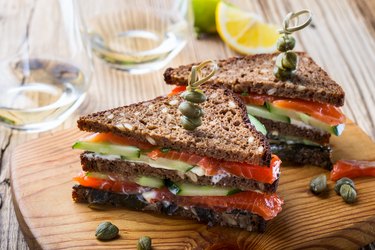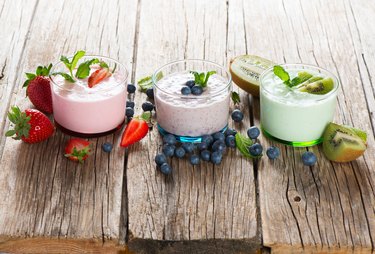

A set meal plan helps you deflect your kids' cries for fast food and junky snacks. You'll streamline your shopping and ensure that your kids are exposed to a variety of foods. Design a meal plan that provides balance among the food groups and portion sizes appropriate for your kids' ages, sizes and activity levels.
Video of the Day
Four- to 5-year-olds generally need between 1,200 and 1,600 calories per day to stay at a healthy weight. A sedentary 6- to 8-year-old might need just 1,200 calories, but if he's very active, his energy needs might go up to 1,800 calories. Nine- to 17-year-olds need anywhere from 1,600 to 3,200 calories daily to support their energy needs -- depending on size and activity level. Larger, athletic kids should aim for the higher range.



Video of the Day
Each day in a seven-day meal plan should include a balance of foods to ensure adequate nutrient intake. If your child needs fewer calories, aim for the lower-serving range. A child needs between 4 and 10 ounces of grains -- half of which should be whole grains -- a day. Aim for at least 1 1/2 cups of veggies daily; kids who require more calories may consume as many as 4 cups daily. Weekly, you'll want to plan for at least 1 cup of dark green vegetables, 3 cups of red and orange vegetables, 1/2 cup of beans and peas, and 3 1/2 cups of starchy vegetables. Double these veggie servings for kids eating 3,200 calories per day. Just 1 to 2 1/2 cups of fruit per day suffices. Offer 1 1/2 to 2 1/2 cups of dairy foods daily to support growing bones. For proteins, like meats, fish and poultry, plan for between 3 and 7 ounces of lean protein, such as fish and poultry, daily.
A healthy week's worth of meals includes breakfasts, such as whole-grain toast with nut butter and apple slices; oatmeal with berries and milk; scrambled eggs with diced bell pepper and 100 percent orange juice; or whole-grain pancakes with low-fat yogurt. Serve protein-filled hardboiled eggs with a whole-wheat bagel, or blend a smoothie using milk and frozen, unsweetened fruit. For a quick and easy meal, pour milk over whole-grain, low-sugar cereal.
Lunches might include fresh turkey or roast beef on whole grain bread; low-sodium vegetable soup; a whole-grain pita with hummus; peanut butter on whole wheat bread with bananas; or low-fat cheese with whole-grain crackers. Serve carrot and celery sticks, grape tomatoes, a handful of grapes, low-fat yogurt or unsalted almonds on the side or as snacks. Skip soda and juice drinks -- serve water instead.